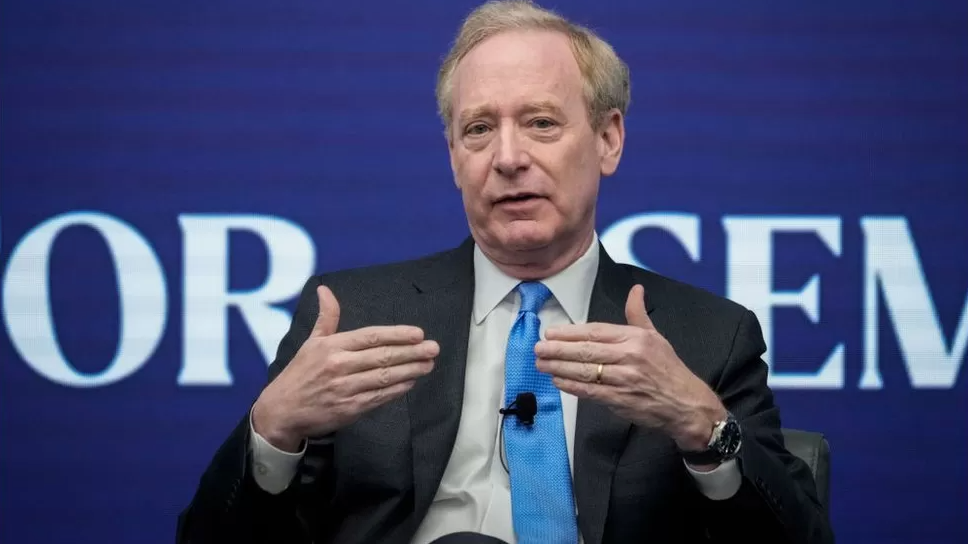|
Getting your Trinity Audio player ready...
|
Microsoft’s president, Brad Smith, has criticized the UK after it blocked the tech giant’s attempt to purchase Activision Blizzard. Smith says the decision was “bad for Britain” and claimed that the European Union (EU) was a more attractive place to start a business. The Competition and Markets Authority (CMA) defended its decision, by saying it had to do what was best for the people, “not merging firms with commercial interests”.
The UK’s decision to block the $68.7bn (£55bn) deal means that it cannot go ahead globally, although US and EU regulators have yet to decide on whether to approve the deal. If the deal had been approved, it would have been the gaming industry’s largest-ever takeover and would have given Microsoft control of popular games titles such as Call of Duty, Candy Crush, and World of Warcraft.
Smith expressed his disappointment with the CMA’s decision and said that it was “more than that, unfortunately, I think it’s bad for Britain”. He argued that the decision would shake confidence in the future of the opportunity to grow a technology business in Britain. A spokesperson for Prime Minister Rishi Sunak said that Smith was wrong to say the CMA’s decision was bad for Britain and that the UK games sector had doubled in size over the last 10 years.
The CMA’s ruling was based on concerns that the deal would hit innovation and give gamers less choice in the fast-growing cloud gaming market, where people buy subscriptions to access games online. Microsoft already had a 60-70% share of the cloud gaming market, and combining with Activision would “really reinforce… [its] strong position”, said the CMA.
In an interview with the BBC, Gareth Sutcliffe, senior games analyst at Enders Analysis, criticized Microsoft’s approach, saying that “the signs were clear for months that this deal was in trouble with UK regulators and yet Microsoft executives didn’t prioritize it or heed the evidence that it was.”
The UK government has made it one of its post-Brexit goals to bring in a “light-touch” set of rules for science and technology to encourage economic growth. However, the number of recent takeovers of British firms by overseas ones has increased concerns that the UK market is declining in importance and failing to attract fast-growing tech firms.
Microsoft and Activision have both said that they will appeal against the CMA’s decision. For the deal to go ahead, it has to be approved by regulators in the UK, the US, and the EU.
The deal between Microsoft and Activision has been blocked by the UK regulator, the Competition and Markets Authority (CMA), which has caused frustration for Microsoft’s president, Brad Smith. Smith has criticized the UK and said that the EU is a better place to start a business.
The UK’s move means that the $68.7 billion deal cannot go ahead globally. If it had been approved, it would have been the gaming industry’s biggest-ever takeover and would have seen Microsoft acquire hugely popular games titles such as Call of Duty, Candy Crush, and World of Warcraft.
In an interview with the BBC’s Wake up to Money program, Smith said Microsoft was “very disappointed” with the CMA’s decision, “but more than that, unfortunately, I think it’s bad for Britain.” He went on to say that the decision has shaken confidence in the future of the opportunity to grow a technology business in Britain. Smith’s comments were met with criticism from the UK government, which said that the UK games sector had doubled in size over the last 10 years.
The CMA’s chief executive, Sarah Cardell, defended the decision, saying that it was important to support competition in the UK and create an environment where different companies can compete effectively, grow, and innovate.
The regulator was concerned that the deal would hit innovation and give gamers less choice in the fast-growing cloud gaming market, where people buy subscriptions to access games online. Microsoft already had a 60-70% share of the cloud gaming market, and combining with Activision would “really reinforce… [its] strong position”.
The deal’s blockage is a blow to Microsoft, which sees cloud gaming as the future of the industry and wants to strengthen its position in the market. The acquisition of Activision would have given it access to popular game titles and allowed it to compete more effectively with rivals like Sony. Sony’s position is that if the deal went ahead, Microsoft would have an incentive to restrict access to Activision’s titles to PlayStation, which would be bad for gamers.
Analysts say that Microsoft had misjudged its approach and had ample opportunity to do things differently over the past 16 months but failed to provide a convincing enough case. Despite the setback, both Microsoft and Activision have said they will appeal against the CMA’s decision.
For the deal to work, it has to be approved by regulators in the UK, the US, and the EU. While the UK is the first to announce its decision, the US Federal Trade Commission last year began a legal challenge to block the takeover. In March, EU regulators delayed their decision after Microsoft proposed concessions to get the deal over the line.
The UK government has made it one of its post-Brexit goals to bring in a “light-touch” set of rules for science and technology to encourage economic growth, but recent takeovers of British firms by overseas ones have increased concerns that the UK market is declining in importance and is failing to attract fast-growing tech firms.
The situation underscores the importance of competition in the industry and the role of regulators in safeguarding the interests of consumers and preventing the creation of monopolies that can stifle innovation and consumer choice. The gaming industry is a vital part of the technology sector, and the outcome of the deal will have far-reaching implications for the future of the industry.
